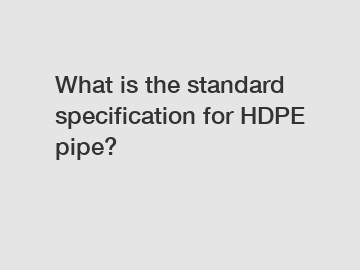Feb. 20, 2024
Rubber & Plastics
Valor Pipe Product Page
From plumbing and irrigation systems to natural gas distribution and industrial applications, High Density Polyethylene (HDPE) pipes play a vital role in various industries due to their durability, flexibility, and resistance to corrosion. .
But what exactly is the standard specification for HDPE pipes? Understanding the technical details and standards of HDPE pipes is crucial for ensuring the safety and efficiency of any piping system. In this blog post, we will delve into the key specifications of HDPE pipes that set them apart as a preferred choice for numerous applications.

One of the most important standards for HDPE pipes is the American Water Works Association (AWWA) C906 standard. This standard covers the material properties, dimensions, and performance requirements for HDPE pipes used in potable water transmission and distribution systems. AWWA C906 specifies the minimum requirements for the design, fabrication, testing, installation, and performance of HDPE pipes with nominal sizes ranging from 4 inches to 63 inches.
In terms of material properties, HDPE pipes must comply with specific requirements for density, Melt Flow Rate (MFR), tensile strength, and impact resistance. The density of HDPE pipes is typically between 0.941 g/cm³ and 0.965 g/cm³, while the MFR should fall within the range of 0.1 g/10 minutes to 10 g/10 minutes. Tensile strength is a critical property that determines the structural integrity of HDPE pipes, with minimum values typically set at 3300 psi for PE 3408 and 3600 psi for PE 4710.
In addition to material properties, HDPE pipes must meet strict dimensional requirements as per the AWWA C906 standard. The outside diameter (OD) of HDPE pipes should fall within a specified range for each nominal size, ensuring proper compatibility with fittings and other components. Wall thickness is another key dimension that affects the pressure rating and performance of HDPE pipes, with minimum values set to provide the required structural strength.
Apart from the AWWA C906 standard, HDPE pipes may also be manufactured in accordance with other international standards such as ISO 4427 and ASTM D3035. These standards define additional requirements for HDPE pipes related to quality control, testing procedures, and certification. By adhering to recognized standards, manufacturers can ensure that their products meet the highest quality and performance standards.
When selecting HDPE pipes for a specific application, it is essential to consider the intended use, operating conditions, and environmental factors. For example, pipes used for potable water distribution must meet stringent health and safety requirements to prevent contamination and ensure water quality. On the other hand, pipes used for industrial applications may require higher resistance to chemicals, abrasion, and temperature fluctuations.
In terms of installation, HDPE pipes offer several advantages over traditional materials such as steel and PVC. HDPE pipes are lightweight, flexible, and easy to handle, reducing the labor and equipment needed for installation. The smooth inner surface of HDPE pipes also minimizes friction and pressure losses, resulting in higher flow rates and improved efficiency.
In conclusion, the standard specification for HDPE pipes encompasses a wide range of technical requirements related to material properties, dimensions, performance, and installation. By following recognized standards such as the AWWA C906, manufacturers can produce high-quality HDPE pipes that meet the demanding requirements of modern piping systems. Whether used for potable water distribution, gas transmission, or industrial applications, HDPE pipes offer a reliable and cost-effective solution for a variety of piping needs.
Click here to get more.
Are you interested in learning more about hdpe floater? Contact us today to secure an expert consultation!
If you are interested in sending in a Guest Blogger Submission,welcome to write for us!
All Comments ( 0 )